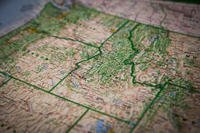For many of us, the idea of buying a home brings to mind pictures of fun times with family and friends, decorating and making it your own or maybe just having more space. As you start your search, it will be important to know the true cost of homeownership, so you can pick the right one.
Up-Front Costs: Prepare to Pay These Before You Move In
Down payment. A down payment is the amount you contribute toward a home's purchase price. Although it's not required for all mortgages, such a VA home loans, depending on the lender or loan type, it can range from 0% to 20% of a home's sale price.
Home inspection. Even if your lender doesn't require it, a home inspection is a smart investment. It can detect existing problems with the home and, depending on the results, might give you an opportunity to renegotiate the price, ask for repairs or even back out of the offer. According to HomeAdvisor, costs typically range between $278 and $391.
Closing costs. Before you can finalize the sale, you'll be responsible for several fees. Your lender should provide you with an estimate of how much you can expect to pay in closing costs, but they typically range between 2% and 5% of the loan. So, on a $350,000 loan, you could expect to pay between $7,000 and $17,500. These are some of the closing costs you may be required to pay:
- Appraisal fee. Required by lenders, an appraiser provides you and your lender an independent, estimated value of the property. It will ensure you're not paying more than what the house is worth. The average cost is $300 to $500.
- Taxes. Depending on when you close and when property taxes are due, you could owe several months' worth of property taxes at closing. They're calculated based on your home's value.
- Homeowners insurance. Most people expect to pay homeowners insurance, but many don't realize they may have to prepay an entire year at closing.
- Private mortgage insurance. If your lender requires private mortgage insurance (PMI), you may have to pay the first premium at closing.
- Attorney fees. Some states require you to have an attorney manage closing to make sure all the documentation is set up correctly, so you're protected.
- Processing fees. These fees cover the lender's costs to prepare the loan. They could include loan origination or credit report fees and the cost of the application.
- Other costs. Additional costs could include survey fees (to determine the property boundaries), title insurance and recording charges (the cost for state and local governments to record your deed, mortgage and loan documents).
Moving costs. Whether you rent a truck to move yourself or hire a moving service, don't forget to add those costs to your budget.
Ongoing Costs: Prepare for the Long-Term Costs of Homeownership
Mortgage payment. Once you've negotiated a purchase price and know your rate, your loan officer can tell you what your monthly loan payment will be. If you select a fixed-rate loan, your principal and interest payment won't change over time; adjustable-rate loan payments may change as the loan's rate adjusts.
Taxes. Your yearly taxes are based on the value of the property and your state's/locality's rates. Home sellers must give you the current property tax assessment, and the seller's real estate agent can provide the amount of tax paid the previous year.
Insurance. In addition to homeowners insurance, you also may be required to carry flood or other hazard insurance, depending on the home's location. And, depending on your loan type and if your down payment is less than 20% of the loan amount you may have to pay private mortgage insurance (PMI).
Homeowners association fees. If your home is in a development governed by a homeowners association (HOA), you'll probably have to pay fees. Most listing services like Realtor.com and Zillow.com include the HOA fees in their property listings. It's a good idea to find out if the fees are increased periodically and, if so, how often and by how much.
Upkeep Costs: Prepare to Keep Your Home Current and in Good Shape
Decorating and Home improvements. If you bought a fixer-upper (or even if you didn't), you'll probably have a list of home projects that you hope to do. Before diving in, price out their cost and, if you aren't planning to do them yourself, get an estimate from more than one person. If your savings won't cover your projects, once you've made payments for a while, you may be able to use your home's equity to finance improvements.
Maintenance. Keeping the lawn trimmed, lights on and the house comfortable are ongoing expenses. Appliances, windows, the roof and other components will age and need to be repaired or replaced periodically. Some, like a furnace, won't need to be replaced for 15 to 20 years, but ask the seller how old everything is. Having an emergency fund can help you cope with the cost of unexpected repairs.
Keep More of Your Money
Our Finance Newsletter can help. For the latest military news, financial tips and more, subscribe to Military.com and have the information you need delivered directly to your inbox.




